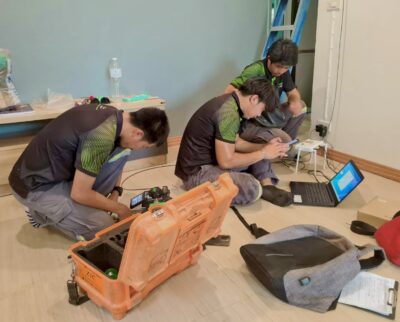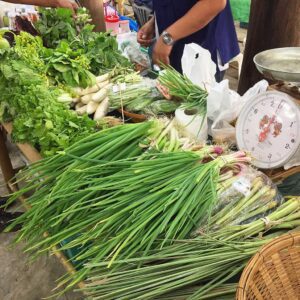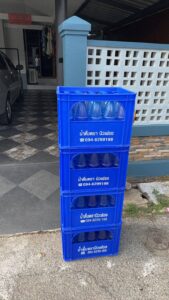By Josh Butterworth. Josh is Impact Teaching’s Thailand Program Coordinator, and he lives in Thailand.
After arriving in the place you’ll be calling home for the next year, whether that’s the mountains of Chiang Rai, by the beach in Chumphon or anywhere in between – you’ll still be busy soaking it all in. By now, you may have developed more of an understanding of how much things cost – but this is when you’ll face some larger expenses and it’s important to focus on reducing your outgoings as much as possible.
The cost of living in Thailand compared to ‘back home’, wherever that me be, is likely to be significantly less. You can absolutely live cheaply here, but you’ll easily overspend if you maintain the attitude that you can afford whatever you want, whenever you want.
I’m here to give you some money saving tips that will help keep costs down, so that money never becomes an issue and you can enjoy your experience to the fullest. Although Thailand is cheap – it’s not free.
This week, we’ll discuss how to save money at home and around the house!
Finding accommodation (rent)
 Rent is likely to be your biggest expense wherever you may be in the world, and despite being significantly cheaper than what you’re used to paying back home – this is no different in Thailand. Whether your school offers you accommodation on campus or helps you find somewhere close by, I would strongly recommend only committing to a month or two. They’re going to prioritize the convenience of getting into school over somewhere that ticks all your boxes. So if this means opting to stay in a hotel for a while, so be it.
Rent is likely to be your biggest expense wherever you may be in the world, and despite being significantly cheaper than what you’re used to paying back home – this is no different in Thailand. Whether your school offers you accommodation on campus or helps you find somewhere close by, I would strongly recommend only committing to a month or two. They’re going to prioritize the convenience of getting into school over somewhere that ticks all your boxes. So if this means opting to stay in a hotel for a while, so be it.
Another benefit of waiting before you commit to somewhere is that you afford yourself the opportunity to meet your colleagues and potentially move in with them. They may have a spare room or someone might be looking for a new place, and you could share with them. This means you’ll have the option of a far nicer place, potentially with a garden and an extra room. Plus, you need some time to explore your new city and find the areas where you feel most at home. Don’t rush, try to find a flat mate and see which areas you like. This will not only save you money but also make your whole experience more enjoyable.
Outside of Bangkok, Chiang Mai and Phuket – you shouldn’t really be paying more than 5,000 baht for a room or a one bedroom condo, or 10,000 baht for a nice three bedroom house with an outdoor space. However, this will not apply if you want somewhere really fancy or a more Western style property.
Keeping cool (air-conditioning)
As you may already know – Thailand is hot. Temperatures often topple 40° in the summer months of March and April, so turning on the air-conditioning during this time is absolutely necessary, but it will be expensive. The cost of energy in Thailand has risen in recent years, as it has across the world. During the hot season you can expect monthly bills of between 4,000 and 5,000 baht (around £100) for a three bedroom house, but a lot lower if you’re just cooling one room. This may seem very cheap in comparison to what you’re paying in your home country, but it’s a lot in Thailand, and does take up a larger chunk of your wage.
If you need it, and certainly during the hot season, don’t feel guilty about using the AC. However, there is an alternative – for around 200 to 500 baht you can buy a fan. They’re a far more economical way of cooling yourself and will save you a lot of money in the long run.
Regardless of what time of the year you arrive in Thailand, it will take you some time to adjust to the heat and you may need to use the AC. But I recommend investing in a fan as soon as you can, and once you’ve acclimatized, trying to use the AC as little as possible. When you do use the AC, just try to have it as warm as possible so that you are still comfortable and cool. It’s horrible being too warm and it makes everything a lot more difficult, but try going for the Thai style of a using a fan instead of AC as much as you can, and your bank balance will greatly appreciate it.
Cooking (stocking your kitchen)
 Eating out in Thailand is a joy – you can enjoy a delicious plate of pad krapow for £1.20 or a massive bowl of noodles for £1.80 – so eating out at restaurants and from street food vendors for every meal is definitely affordable. But it’s not always easy to maintain a balanced and healthy diet doing this, getting enough vegetables and fiber can be difficult. In the long run, it’s a good idea to cook at least some of your meals at home, even if you don’t enjoy it very much.
Eating out in Thailand is a joy – you can enjoy a delicious plate of pad krapow for £1.20 or a massive bowl of noodles for £1.80 – so eating out at restaurants and from street food vendors for every meal is definitely affordable. But it’s not always easy to maintain a balanced and healthy diet doing this, getting enough vegetables and fiber can be difficult. In the long run, it’s a good idea to cook at least some of your meals at home, even if you don’t enjoy it very much.
At the market, a massive bag of thirty eggs will set you back no more than a few pounds, and a big bundle of vegetables around 30p. Cooking at home is not only better for your health, but also for your wallet. And when you do start cooking – try to do the bulk of your shopping in markets rather than supermarkets. This will save you a lot of money and give you a true cultural experience, as well as being a great way to practice your Thai. But if you are craving Western ingredients like cheese or bread then supermarkets and shops will be your best bet, just try to limit them if you want to keep your budget down.
However, there is a slight caveat to all of this. You are very unlikely to find accommodation with a fully equipped kitchen – no oven, no stove, no pots, pans, plates or any cooking utensils at all – you may not even have a kitchen. So when looking for somewhere to live, I strongly recommend to aim for somewhere with a place to cook, and most landlords usually provide a fridge. Paying for all the equipment and utensils you need does add up, I suggest waiting a few months before investing if you can, and try to eat as healthily as possible in the meantime. Look on Facebook Marketplace and ask friends if they have anything second hand. Get what you need and no more – a rice cooker, a small stove, an air fryer, plates, glasses and cutlery. Your health is important – cooking will improve it, give you a sense of satisfaction, make you feel more at home and save you money.
Getting online (WIFI and data)
Whether you’re preparing lessons, binging your favourite Netflix show or catching up with friends back home – we all need a good internet connection these days. Luckily for you, Thailand has 5G coverage in most areas and powerful WIFI is available. I highly recommend getting a travelers SIM in your home country prior to leaving, this means you can pop it in your phone as you’re landing in Bangkok and use the internet straight away. However, once this runs out, the add-on packages can be expensive. After arriving in the city you’ll be living in, it’s a good idea to get a cheap SIM from 7-Eleven or a phone shop such as AIS. On a travelers SIM you could be paying around 300 baht (£6-7) a week, whereas a local SIM will be cheaper for the whole month. And just remember – you need your passport when buying a SIM card in Thailand.
Getting WIFI is more of a tricky one – it’s very useful having a Thai person to help, so get friendly with neighbors and the local teachers at your school, or your landlord may assist you. Of course, you’ll only be getting WIFI when you’re settled somewhere, which might be a month or so after you’ve arrived. Search around with a Thai person for the best offers, and it’s also a lot cheaper if you’re sharing the cost with a house mate or mates. Then once you have WIFI, there are often fantastic deals on free SIM cards, TV subscriptions and more. This might be the point where you add on an extra hundred baht (£2) to your monthly subscription and receive a few free SIM cards. Be frugal and always on the hunt for discounts.
Between 700 and 800 baht (around £16) is a fair price to pay for WIFI each month, this will get you a very strong connection that can support several people all streaming, gaming or on video calls at the same time.
Keeping hydrated (water)
 Drinking a lot of water in Thailand is crucial, it’s easy to get dehydrated with the hot temperatures and blazing sun, but you cannot consume the tap water. This can cause issues for people from cooler countries where tap water is ok to drink, and takes some getting used to. In Thailand you have three options – buy bottled water from the shop, use refill stations or get water delivered.
Drinking a lot of water in Thailand is crucial, it’s easy to get dehydrated with the hot temperatures and blazing sun, but you cannot consume the tap water. This can cause issues for people from cooler countries where tap water is ok to drink, and takes some getting used to. In Thailand you have three options – buy bottled water from the shop, use refill stations or get water delivered.
Bottled water is the most expensive option, I would only recommend buying it if you’re out and need a drink. It’s can also a pain to buy in bulk and transport home, as well as all the plastic being bad for the planet. Using refill stations found throughout residential areas is a cheaper option, pennies for a big five litre bottle, but they are rather inconvenient unless you have a car. With the large amount of water that you should be drinking, filling up bottles is time consuming and they’re difficult to transport home on a moped or by foot.
Once you’re settled in your house or condo, your best option is to get water delivered. They come either in the form of big drums or crates of large bottles – the containers are returned, cleaned and reused. Speak to your landlord about this and they should be able to arrange it for you, if not, try a Thai friend. This won’t save you a fortune but every little helps, and it’s far nicer to know you have a large amount of water available, and don’t have to nip to the shop or a refill station every time you need a drink.
Take your time when you arrive in Thailand, aim to keep costs down as much as you can in the first few months and wait for a few pay checks before spending big on anything. You’re there for at least a year, so don’t rush into committing to a rental contract, look around for flatmates and find where the best area is for you. When you can, get what you need to cook and use it as a way to turn your house into a home, as well as looking after your health and saving money. In the long run, these tips could reduce your spending by at least a few thousand baht every month. It may seem like a lot of work initially, but are very easy to maintain once implemented, and will pay you back with a better quality of life as well as more money to spend on what you enjoy.
Don’t be a tourist. Live like a local.
Here at Impact Teaching, we can help you get started in Thailand, as we work with schools throughout the country.
Check out our program page, and get in touch.
Speak soon!




